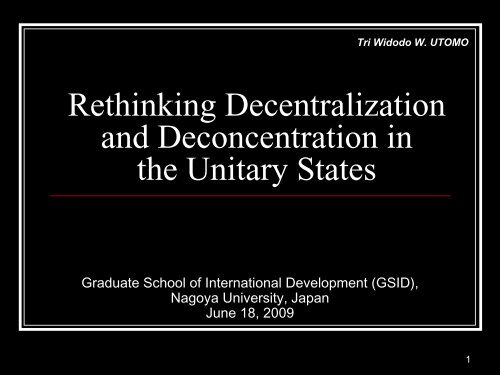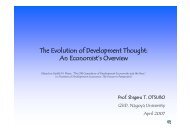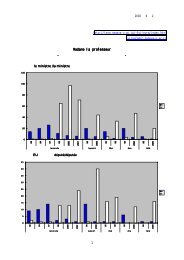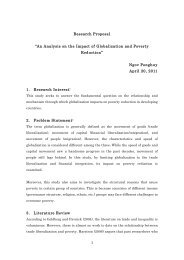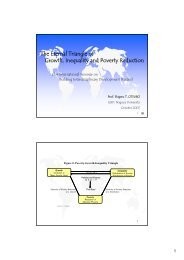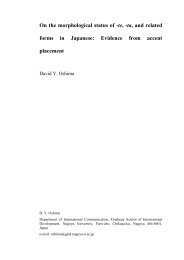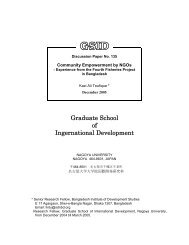Rethinking Decentralization in the Unitary States
Rethinking Decentralization in the Unitary States
Rethinking Decentralization in the Unitary States
You also want an ePaper? Increase the reach of your titles
YUMPU automatically turns print PDFs into web optimized ePapers that Google loves.
Tri Widodo W. UTOMO<br />
<strong>Reth<strong>in</strong>k<strong>in</strong>g</strong> <strong>Decentralization</strong><br />
and Deconcentration <strong>in</strong><br />
<strong>the</strong> <strong>Unitary</strong> <strong>States</strong><br />
Graduate School of International Development (GSID),<br />
Nagoya University, Japan<br />
June 18, 2009<br />
1
Structure of Presentation<br />
◦ Understand<strong>in</strong>g <strong>Decentralization</strong>.<br />
◦ Centralization – <strong>Decentralization</strong><br />
Debate.<br />
◦ <strong>Unitary</strong> <strong>States</strong> vs Federal <strong>States</strong>.<br />
◦ Country Experiences (Japan, Ch<strong>in</strong>a,<br />
France, Indonesia, MENA).<br />
2
Part 1<br />
Understand<strong>in</strong>g <strong>Decentralization</strong><br />
3
<strong>Decentralization</strong><br />
(Rond<strong>in</strong>elli and WB, 1999)<br />
◦ Political decentralization;<br />
◦ Adm<strong>in</strong>istrative decentralization:<br />
• Deconcentration<br />
• Delegation<br />
• Devolution<br />
◦ Fiscal decentralization;<br />
◦ Market decentralization.<br />
4
<strong>Decentralization</strong> &<br />
deconcentration def<strong>in</strong>ed<br />
Source Dec. / Dev. Deconcentration<br />
World Bank<br />
UNDP<br />
Hellmut<br />
Wollman<br />
is <strong>the</strong> transfer of authority and<br />
responsibility for public functions<br />
from <strong>the</strong> central government to<br />
subord<strong>in</strong>ate or quasi-<strong>in</strong>dependent<br />
government organizations and/or<br />
private sector.<br />
concerned with <strong>the</strong> political as<br />
well as <strong>the</strong> economic (and<br />
adm<strong>in</strong>istrative) arguments.<br />
powers and functions (as well as<br />
resources) are assigned to subnational<br />
bodies and actors that<br />
possess some political autonomy<br />
<strong>in</strong> <strong>the</strong>ir own right full<br />
municipalisation<br />
is <strong>the</strong> weakest form of<br />
decentralization – redistributes<br />
decision mak<strong>in</strong>g authority<br />
and f<strong>in</strong>ancial responsibilities<br />
among different levels of <strong>the</strong><br />
national government.<br />
concerned ma<strong>in</strong>ly with <strong>the</strong><br />
adm<strong>in</strong>istrative rationale and<br />
to some extent with <strong>the</strong><br />
economic arguments.<br />
adm<strong>in</strong>istrative functions be<strong>in</strong>g<br />
done through <strong>the</strong> establishment<br />
of regional or local “field<br />
offices” limited<br />
municipalisation.<br />
5
<strong>Decentralization</strong> n deconcentration def<strong>in</strong>ed<br />
cont’d …<br />
Source Dec. / Dev. Deconcentration<br />
Robertson<br />
Work<br />
refers to <strong>the</strong> full transfer of<br />
responsibility, decisionmak<strong>in</strong>g,<br />
resources and<br />
revenue generation to a local<br />
level public authority that is<br />
autonomous and fully<br />
<strong>in</strong>dependent of <strong>the</strong> devolv<strong>in</strong>g<br />
authority.<br />
can be seen as <strong>the</strong> first step <strong>in</strong><br />
a newly decentraliz<strong>in</strong>g<br />
government to improve<br />
service delivery.<br />
Hutchcroft<br />
<strong>in</strong>volves a much more extensive<br />
transfer of decision-mak<strong>in</strong>g<br />
authority and responsibility to<br />
local government units<br />
(commonly regions, prov<strong>in</strong>ces,<br />
and/or municipalities).<br />
<strong>in</strong>volves an <strong>in</strong>traorganizational<br />
transfer of<br />
particular functions and<br />
workloads from <strong>the</strong> central<br />
government to its regional or<br />
local offices.<br />
6
Adm<strong>in</strong>istrative <strong>Decentralization</strong><br />
(UNDP, 1999)<br />
7
Disagreement<br />
◦ Falleti (2004): excludes market from decentralization.<br />
<strong>Decentralization</strong> is a set of state reforms; it does not <strong>in</strong>clude<br />
transfers of authority to non–state actors.<br />
◦ Coll<strong>in</strong>s & Green (1994): decentralization transfers authority<br />
from centre to periphery; while privatization transfers from public<br />
sector to private sector.<br />
◦ Sherwood (1969): decentralization describes an <strong>in</strong>traorganizational<br />
pattern of power relationships; while devolution<br />
describes an <strong>in</strong>ter-organizational pattern.<br />
◦ Fesler (1968): deconcentration is not a type of decentralization<br />
at all. It does not require any decentralization of power s<strong>in</strong>ce it does<br />
not provide <strong>the</strong> opportunity to exercise substantial local discretion <strong>in</strong><br />
decision-mak<strong>in</strong>g.<br />
◦ Ribot (2004): <strong>Decentralization</strong> comes <strong>in</strong> two primary forms:<br />
democratic decentralization (also called political decentralization or<br />
devolution) & deconcentration (also known as adm<strong>in</strong>istrative<br />
decentralization).<br />
8
5 Typology of <strong>Decentralization</strong><br />
(Smith, 2001)<br />
9
2 Typology of <strong>Decentralization</strong><br />
(Ribot, 2004)<br />
10
3 Typology of <strong>Decentralization</strong><br />
(Brilantes Jr., 2004)<br />
11
Two senses of decentralization<br />
mean<strong>in</strong>g:<br />
◦ In <strong>the</strong> broader sense covers all<br />
category, as far as it deals with any<br />
transfer of authority from national govt<br />
ei<strong>the</strong>r to subnational govt or non-govt<br />
actors.<br />
◦ In <strong>the</strong> narrow sense refers to<br />
devolution (transfer from public to<br />
sector; from central to local).<br />
12
<strong>Decentralization</strong><br />
is a “two-edged of sword” (1)<br />
◦ Combat<strong>in</strong>g corruption (Arikan 2004, Fjeldstad 2004,<br />
Fisman 2002);<br />
◦ Reduction <strong>in</strong> poverty (Braa<strong>the</strong>n 2008, Crook 2001,<br />
UNDP 2000, Moore and Putzel 1999);<br />
◦ Improv<strong>in</strong>g service delivery (WB 2001, Kolehma<strong>in</strong>en-<br />
Aitken 1999; McLean 1999, Dill<strong>in</strong>ger 1994);<br />
◦ Fortify<strong>in</strong>g accountability (WB 2000);<br />
◦ Prevent<strong>in</strong>g conflicts (Sasaoka 2007, Siegle and<br />
O’Mahony);<br />
◦ Lead<strong>in</strong>g to significant improvement <strong>in</strong> <strong>the</strong> welfare of<br />
people at <strong>the</strong> local level (UNDP 2000);<br />
◦ Empower<strong>in</strong>g community (Br<strong>in</strong>kerhoff 2006).<br />
13
<strong>Decentralization</strong><br />
is a “two-edged of sword” (2)<br />
◦ Soft–budget constra<strong>in</strong>ts, macro–economic <strong>in</strong>stability,<br />
clientelism, and enlargement of bureaucracies<br />
(Cornelius 1999; Fox and Aranda 1996; Rodden 2000;<br />
Rodden and Wibbels 2002; Ste<strong>in</strong> 1998, quoted from<br />
Falleti 2004);<br />
◦ Increas<strong>in</strong>g disparities; can jeopardize stability; may<br />
underm<strong>in</strong>e efficiency (Prud’homme, 1995);<br />
◦ The rise of decentralized corruption ruled by<br />
predatory local officials; <strong>the</strong> rise of money politics<br />
and <strong>the</strong> consolidation of political gangsterism (Hadiz,<br />
2003).<br />
14
Paradigm of <strong>Decentralization</strong><br />
(Smith, 2001)<br />
15
Part 2<br />
Centralization – <strong>Decentralization</strong><br />
Debate<br />
16
Centralization – <strong>Decentralization</strong><br />
◦ What is Centralization?<br />
<strong>the</strong> concentration of adm<strong>in</strong>istrative<br />
power <strong>in</strong> <strong>the</strong> hands of a central authority,<br />
to which all <strong>in</strong>ferior departments and<br />
local branches are directly responsible.<br />
◦ What is <strong>Decentralization</strong>?<br />
<strong>the</strong> weaken<strong>in</strong>g of <strong>the</strong> central authority<br />
and distribution of its functions among<br />
<strong>the</strong> branches or local adm<strong>in</strong>istrative<br />
bodies.<br />
(Cumm<strong>in</strong>g 1995, Hutchcroft 2001, Dickovick 2003, Gerr<strong>in</strong>g, Thacker & Moreno 2004)<br />
17
Centralization – <strong>Decentralization</strong><br />
Which one is more accurate?<br />
◦ <strong>Decentralization</strong> is <strong>the</strong> opposite of<br />
Centralization, OR:<br />
◦ <strong>Decentralization</strong> is <strong>the</strong> opposite of<br />
Deconcentration ??<br />
How do we expla<strong>in</strong> <strong>the</strong> relationship<br />
between Centralization,<br />
<strong>Decentralization</strong>, and Deconcentration?<br />
18
Centralization – <strong>Decentralization</strong><br />
(Dickovick 2003, Hutchcroft 2001, Cumm<strong>in</strong>gs 1995)<br />
Centralization V.S. <strong>Decentralization</strong><br />
2 variants of centralization:<br />
• Concentration<br />
• Deconcentration<br />
Deconcentration V.S. <strong>Decentralization</strong><br />
19
Deconcentration – <strong>Decentralization</strong><br />
dichotomy OR cont<strong>in</strong>uum?<br />
◦ Dichotomy substitute pr<strong>in</strong>ciple.<br />
◦ Cont<strong>in</strong>uum complementary<br />
pr<strong>in</strong>ciple.<br />
20
Deconcentration – <strong>Decentralization</strong><br />
◦ Cheema & Rond<strong>in</strong>elli (2007): <strong>the</strong> relationship<br />
between deconcentration and devolution should not be<br />
seen as a dichotomy or as mutually exclusive, but<br />
ra<strong>the</strong>r can best be understood as a matrix of<br />
relationships.<br />
◦ FAO (2006): deconcentration and decentralization, far<br />
from replac<strong>in</strong>g each o<strong>the</strong>r, have always been<br />
considered as complimentary by political decision<br />
makers.<br />
◦ Cumm<strong>in</strong>gs (1995): <strong>the</strong> question of centralization or<br />
decentralization is simply a matter of proportion; it is a<br />
matter of f<strong>in</strong>d<strong>in</strong>g <strong>the</strong> optimum degree for <strong>the</strong><br />
particular concern.<br />
◦ UNDP (1999): <strong>Decentralization</strong> is not an alternative to<br />
centralization. Both are needed.<br />
21
Cont<strong>in</strong>uum of Decon – Decent<br />
Brillantes Jr. (2004)<br />
22
Cont<strong>in</strong>uum of Decon – Decent<br />
Fritzen & Lim (2006)<br />
23
Equilibrium of centralization &<br />
decentralization forces<br />
Source: Kauzya (no year)<br />
24
Centralization / Decon – Decent<br />
Interface Model<br />
Model 1: Deconcentration comes before decentralization.<br />
Model 2: Deconcentration is accomplished alongside decentralization<br />
on its own field of authority.<br />
Model 3: Deconcentration and decentralization is simultaneously run<br />
with varied degree on each side.<br />
25
Future Possibility<br />
◦ Brooke (1984): “Probably <strong>the</strong> most thorough<br />
account of <strong>the</strong> relationship between<br />
centralization and autonomy suggested that<br />
beliefs will sw<strong>in</strong>g towards decentralization<br />
unless this is discredited by a series of<br />
disasters.”<br />
◦ Stoner & Freeman (1989): “The clear trend<br />
today is toward more decentralization.”<br />
◦ FAO (2006): “decentralization appears to be<br />
<strong>the</strong> most appropriate policy of today.”<br />
◦ Fleurke & Hulst (2006): “From <strong>the</strong> end of <strong>the</strong><br />
seventies, disadvantages of <strong>the</strong> centralized<br />
adm<strong>in</strong>istrative system became <strong>in</strong>creas<strong>in</strong>gly<br />
obvious.”<br />
26
Country Trends<br />
◦ Myanmar is one of <strong>the</strong> world’s most centralized<br />
states, have expressed <strong>the</strong> need for reforms<br />
<strong>in</strong>volv<strong>in</strong>g a degree of decentralization (Fritzen & Lim<br />
2006).<br />
◦ Brita<strong>in</strong> & France Central government has<br />
always been powerful <strong>in</strong> Brita<strong>in</strong>, which, with France,<br />
is one of <strong>the</strong> most highly centralized, unitary states<br />
<strong>in</strong> <strong>the</strong> western world, but <strong>in</strong> <strong>the</strong> last few years <strong>the</strong><br />
centre has fur<strong>the</strong>r consolidated its power by<br />
<strong>in</strong>creas<strong>in</strong>g its legal, political, and f<strong>in</strong>ancial control<br />
over local authorities (Goldsmith and Newton 1983).<br />
◦ Costa Rica centralist tradition <strong>in</strong> that country is<br />
among <strong>the</strong> strongest <strong>in</strong> Lat<strong>in</strong> America. Efforts to<br />
move away from this tradition (decentralization)<br />
over <strong>the</strong> past 25 years has been done though it is<br />
unsuccessful (Ryan 2004). 27
Part 3<br />
<strong>Unitary</strong> <strong>States</strong> vs. Federal <strong>States</strong><br />
&<br />
Asymmetric <strong>Decentralization</strong><br />
28
<strong>Unitary</strong> & Federal <strong>States</strong> <strong>in</strong> <strong>the</strong> World<br />
<strong>Unitary</strong> <strong>States</strong> Federal <strong>States</strong> Special case: Somalia<br />
29
<strong>Unitary</strong> <strong>States</strong> vs. Federal <strong>States</strong><br />
Source <strong>Unitary</strong> State Federal State<br />
Encyclopedia<br />
Lijphart<br />
Country whose organs of state<br />
are governed as one s<strong>in</strong>gle<br />
unit. The political power of<br />
government may well be<br />
transferred to lower levels, but<br />
central government reta<strong>in</strong>s <strong>the</strong><br />
pr<strong>in</strong>cipal right to recall such<br />
delegated power.<br />
Lower-level governments<br />
derive <strong>the</strong>ir statutory<br />
frameworks from<br />
parliamentary legislation or<br />
an executive order.<br />
Spend<strong>in</strong>g by lower-level<br />
government rema<strong>in</strong>s <strong>the</strong><br />
responsibility of <strong>the</strong> national<br />
government.<br />
A union compris<strong>in</strong>g a<br />
number of partially selfgovern<strong>in</strong>g<br />
states or<br />
regions united by a<br />
central ("federal")<br />
government.<br />
Lower levels of<br />
government have a<br />
constitutional<br />
guarantee of sovereignty<br />
over specific matters.<br />
Responsibility for fiscal<br />
problems is distributed<br />
across different levels<br />
of government.<br />
30
<strong>Unitary</strong> <strong>States</strong> vs. Federal <strong>States</strong><br />
Source <strong>Unitary</strong> State Federal State<br />
Hoesse<strong>in</strong><br />
o Organized under and by central<br />
government (Strong 1951).<br />
o Constitutional government power<br />
embedded at national level<br />
(Baradat 1979).<br />
o Sub-national governments do not<br />
have pouvoir constituant<br />
(Kranenburg 1955).<br />
o Sub-national governments are<br />
created by central government<br />
with authorities written <strong>in</strong> <strong>the</strong><br />
regulation.<br />
o Relationship between central and<br />
sub-national government<br />
represents sub-ord<strong>in</strong>ation<br />
mechanism (K.C.Wheare 1951).<br />
o The state is organized<br />
based on <strong>the</strong> pr<strong>in</strong>ciple<br />
of self rule and shared<br />
rule (Elazar 1991).<br />
o Both federal and state<br />
governments have<br />
pouvoir constituant<br />
(Kranenburg 1955).<br />
o Relationship between<br />
central and subnational<br />
government<br />
represents<br />
coord<strong>in</strong>ation and<br />
autonomy functions<br />
(K.C.Wheare 1951).<br />
31
<strong>Unitary</strong> <strong>States</strong> vs. Federal <strong>States</strong><br />
◦ Prasojo It is impossible to f<strong>in</strong>d any country<br />
which is absolutely Unitarian, or totally Federalist.<br />
The relationship between central and local<br />
government <strong>in</strong> both countries reflects a poly-centric<br />
movement <strong>in</strong>stead of mono-centric. It dynamically<br />
moves from unitary cont<strong>in</strong>uum to federalist<br />
cont<strong>in</strong>uum, and <strong>the</strong> o<strong>the</strong>r way round.<br />
◦ Lidija Basta <strong>the</strong>re is no completely unitary state.<br />
Every state is at least composed of municipalities as<br />
decentralized units. Accord<strong>in</strong>gly, <strong>the</strong> major question<br />
arises as to how to differentiate among a unitary<br />
state practic<strong>in</strong>g deconcentration, a decentralized<br />
unitary state and a federal state.<br />
32
<strong>Unitary</strong> <strong>States</strong> vs. Federal <strong>States</strong><br />
A Constitutional Reform Schemata<br />
(Buchanan, 1995)<br />
33
Dynamics <strong>in</strong> <strong>the</strong> development of<br />
federal system over time (USA)<br />
Boeckenfoerde, 2007<br />
34
<strong>Unitary</strong> <strong>States</strong> vs. Federal <strong>States</strong><br />
Does <strong>Unitary</strong> <strong>States</strong> correspond to<br />
Centralization, while Federal System<br />
corresponds to <strong>Decentralization</strong>?<br />
◦ Does a federal system facilitate<br />
decentralisation better than unitary<br />
systems?<br />
◦ Is <strong>the</strong> success of decentralisation<br />
efforts greater <strong>in</strong> a federal ra<strong>the</strong>r<br />
than <strong>in</strong> a unitary system?<br />
◦ Is federalism <strong>the</strong> logical next step for<br />
decentraliz<strong>in</strong>g unitary systems?<br />
35
<strong>Unitary</strong> <strong>States</strong> vs. Federal <strong>States</strong><br />
◦ Lijphart (1984, <strong>in</strong> Work 2002): “Federalism is not a<br />
necessary condition for decentralization nor is<br />
decentralization a sufficient condition for federalism. We<br />
can have decentralization <strong>in</strong> absence of federalism, and<br />
federations, like unitary systems, can be classified as more<br />
or less decentralized (and even centralized).”<br />
◦ Work (2002): “In practice, <strong>the</strong> l<strong>in</strong>e between<br />
decentralisation, federalism, unitary states and centralised<br />
systems becomes blurred.There is no broad-based<br />
generalisation that can be made about <strong>the</strong> correlation of<br />
federal/unitary states and decentralisation.”<br />
◦ Azfar (1999): “A federal state is not necessarily more<br />
decentralized than a unitary government.”<br />
◦ K<strong>in</strong>g (1982, <strong>in</strong> Baldi 1999): “There is no observed degree<br />
of centralization / decentralization which commonly and<br />
dist<strong>in</strong>ctly marks off federations from unitary states.”<br />
36
Asymmetrical <strong>Decentralization</strong><br />
◦ Asymmetrical decentralization both <strong>in</strong> <strong>Unitary</strong> & Federal<br />
<strong>States</strong> is becom<strong>in</strong>g more common.<br />
◦ Examples <strong>in</strong> <strong>Unitary</strong> system: France (Corsica);<br />
Denmark (Greenland); Tanzania (Zanzibar); United<br />
K<strong>in</strong>gdom (Nor<strong>the</strong>rn Ireland, Scotland, Wales);<br />
Indonesia (Aceh, Papua); Philipp<strong>in</strong>e (Muslim M<strong>in</strong>danao,<br />
Cordillera); Ch<strong>in</strong>a; Japan; etc.<br />
◦ Federal system: Belgium, Malaysia, Spa<strong>in</strong>, Sudan.<br />
37
Part 4<br />
Countries Experiences<br />
38
JAPAN<br />
39
JAPAN<br />
◦ Japan has adopted a two-tiered local<br />
adm<strong>in</strong>istration system consist<strong>in</strong>g of Prefectures<br />
and Municipalities.<br />
◦ Consist of 47 Prefectures. But <strong>the</strong> number of<br />
municipality is decreas<strong>in</strong>g:<br />
• Great Meiji Consolidation: Village & Town<br />
decreased from 71,314 to 15,820; 39 new Cities<br />
created.<br />
• Great Showa: Village & Town decreased from<br />
9,582 to 2,916; Cities <strong>in</strong>creased from 286 to 556.<br />
• Great Heisei: Village & Town decreased from<br />
2,558 to 1,044; Cities <strong>in</strong>creased from 671 to 777.<br />
◦ Japan has changed from a rural to an <strong>in</strong>dustrial<br />
urbanized society.<br />
40
JAPAN<br />
◦ Degree of decentralization will be given based on 2<br />
<strong>in</strong>dicators: population size AND economic base<br />
(employment center).<br />
◦ 3 category of Cities:<br />
• Designated Cities (17 till 2007): Cities hav<strong>in</strong>g<br />
populations of 500,000 or more.<br />
• Core Cities or Chukaku-shi (37 till 2006): Cities hav<strong>in</strong>g<br />
populations of at least 300,000 but less than 500,000<br />
and land areas of over 100 sq km.<br />
• Special Case Cities or Tokurei-shi (39 till 2006): Cities<br />
hav<strong>in</strong>g populations over 200,000.<br />
◦ Asymmetric <strong>Decentralization</strong>: <strong>the</strong> bigger <strong>the</strong> size of<br />
population and <strong>the</strong> economic base of a city, <strong>the</strong> bigger<br />
authority will be transferred by central govt.<br />
◦ Eg: Designated cities are authorized to adm<strong>in</strong>ister <strong>the</strong><br />
same level of governmental jurisdiction as prefectures<br />
<strong>in</strong> 19 policy areas. 41
CHINA<br />
42
CHINA<br />
43
CHINA<br />
◦ The People's Congress of Ch<strong>in</strong>a is <strong>the</strong> supreme<br />
organ of state power. The Local People<br />
Congresses at different levels are <strong>the</strong> state<br />
power organs at local level.<br />
◦ There are 4 municipalities directly under <strong>the</strong><br />
Central Government (The State Council of<br />
Ch<strong>in</strong>a): Beij<strong>in</strong>g, Chongq<strong>in</strong>g, Shanghai, and<br />
Tianj<strong>in</strong>.<br />
◦ The relationship between central – local govt.<br />
<strong>in</strong> Ch<strong>in</strong>a reflects a model of pr<strong>in</strong>cipal – agent<br />
relations.<br />
◦ The above po<strong>in</strong>ts <strong>in</strong>dicate that central<br />
government has decisive role and <strong>in</strong>tervention<br />
over local government.<br />
44
CHINA<br />
◦ Asymmetrical decentralization is to be given to:<br />
• 2 Special Adm<strong>in</strong>istrative Regions: Hongkong & Macau.<br />
• 5 Autonomous Region: Guangxi, Inner Mongol, N<strong>in</strong>gxia,<br />
X<strong>in</strong>jiang, and Xizang (Tibet).<br />
• Special economic zones, and development zones 4<br />
economic zones were created <strong>in</strong> 1978 (Shenzhen,<br />
Zhuhai, Shantou and Xiamen <strong>in</strong> Ha<strong>in</strong>an prov<strong>in</strong>ce).<br />
• Open coastal cities, along East-cost l<strong>in</strong>e In 1984, 14<br />
coastal open cities were created.<br />
• Inland cities, along <strong>the</strong> Yangtze River and border<strong>in</strong>g on<br />
Russia <strong>the</strong>se cities are delegated powers like those of<br />
<strong>the</strong> special economic zones.<br />
◦ Guangdong and Fujian Prov<strong>in</strong>ce were given extensive<br />
autonomy to develop <strong>the</strong>ir region economically.<br />
45
FRANCE<br />
46
FRANCE<br />
47
FRANCE<br />
◦ Consist of 22 Regions (exclud<strong>in</strong>g 4 overseas<br />
region); 100 Département; and 36.763 Commune.<br />
◦ Asymmetrical decentralization is to be given to La<br />
Corse (Corsica) Region.<br />
◦ In <strong>the</strong> political organization of France <strong>the</strong> so-called<br />
‘Jacobean logic’ plays an important role. The logic is<br />
best summarized by <strong>the</strong> expression ‘<strong>the</strong> one and<br />
<strong>in</strong>divisible Republic’ which stands for a tendency<br />
towards centralization and uniformity.<br />
◦ Although decentralization reforms 1982 had a<br />
strong regionalist element, <strong>the</strong>y were described <strong>in</strong><br />
terms of Jacobean logic: ‘<strong>the</strong> decentralization would<br />
promote <strong>the</strong> unity and <strong>in</strong>divisibility of <strong>the</strong> Republic’<br />
(Wollmann 2000; Loughl<strong>in</strong> & Peters 1997; <strong>in</strong><br />
Edwards & Hupe 2000).<br />
48
FRANCE<br />
◦ In 2003-2004, 20 years after <strong>the</strong> great reform 1982,<br />
a new impetus was given to decentralization, still <strong>in</strong><br />
<strong>the</strong> same spirit of consolidation and a search for<br />
balance between central and local powers.<br />
◦ Therefore, France is experienc<strong>in</strong>g a dual delegation<br />
of power: on <strong>the</strong> one hand to local elected officials,<br />
which is decentralization, and on <strong>the</strong> o<strong>the</strong>r to <strong>the</strong><br />
appo<strong>in</strong>ted representative <strong>in</strong> <strong>the</strong> region, which is<br />
deconcentration.<br />
◦ The Prefect is <strong>the</strong> agent of <strong>the</strong> state’s authority and<br />
<strong>the</strong> delegate of <strong>the</strong> prime m<strong>in</strong>ister and of each<br />
m<strong>in</strong>ister <strong>in</strong> <strong>the</strong> territory. The Prefect is responsible<br />
for national <strong>in</strong>terests, adm<strong>in</strong>istrative control and<br />
respect of <strong>the</strong> law.<br />
49
INDONESIA<br />
◦ Territorial width : 1.919.440 km 2 (15 th widest <strong>in</strong> <strong>the</strong> world)<br />
◦ Number of island : 17.508 (6,000 of which are un<strong>in</strong>habited)<br />
◦ Population : 245.453 million (BPS, 2006)<br />
◦ Cultural : 300 languages<br />
50
INDONESIA<br />
51
Local Government<br />
Level of Govt 1999 2004 2009<br />
Prov<strong>in</strong>ce 26 32 33<br />
District / City 309 434 489<br />
Year<br />
Number of Village Govt.<br />
(autonomous & adm<strong>in</strong>istrative)<br />
2002 69.255<br />
2004 69.919<br />
2006 70.611<br />
2008 73.067<br />
Source:<br />
http://id.wikipedia.org/wiki/Jumlah_wilayah_adm<strong>in</strong>istratif_di_Indonesia#cite_note-3<br />
http://id.wikipedia.org/wiki/Pemekaran_daerah_di_Indonesia<br />
52
Degree of centralization – decentralization<br />
<strong>in</strong> Indonesia (1903-2004)<br />
53
7 rounds of decentralization <strong>in</strong> Indonesia<br />
(1903-2004)<br />
54
INDONESIA<br />
◦ Governor is <strong>the</strong> Head of autonomous region,<br />
which is decentralization, and agent of <strong>the</strong><br />
central government, which is<br />
deconcentration. The Governor is responsible<br />
for implement<strong>in</strong>g m<strong>in</strong>imum standard of<br />
service and do<strong>in</strong>g supervision to local govt<br />
on behalf of central govt.<br />
◦ No deconcentration <strong>in</strong> local level (city and<br />
district).<br />
◦ Asymmetrical decentralization is to be given<br />
to Jakarta (capital city), Aceh, and Papua<br />
prov<strong>in</strong>ce.<br />
55
MENA Countries<br />
◦ Most of <strong>the</strong> countries have adopted a twotiered<br />
local govt system consist<strong>in</strong>g of<br />
prov<strong>in</strong>ce and municipalities.<br />
◦ <strong>Decentralization</strong> is applicable for municipal<br />
level, while prov<strong>in</strong>ce govt implement<br />
deconcentration functions. Head of<br />
municipal govt is elected by people, while<br />
head of prov<strong>in</strong>ce is appo<strong>in</strong>ted by central<br />
govt.<br />
◦ There is no any record for asymmetrical<br />
decentralization practices.<br />
57
CONCLUSION<br />
◦ <strong>Decentralization</strong> has multiple mean<strong>in</strong>g, <strong>in</strong>terpretation, and<br />
implementation <strong>in</strong> different country and different context. But<br />
<strong>the</strong>re is common essence of decentralization, that is,<br />
streng<strong>the</strong>n<strong>in</strong>g local authorities through transfer of power and<br />
resources from <strong>the</strong> central govt.<br />
◦ It must never be forgotten that <strong>the</strong> purpose of decentralization is<br />
not to re<strong>in</strong>force local powers or to preserve central power but<br />
exclusively to ensure <strong>the</strong> best service to <strong>the</strong> citizen, service that is<br />
closer, more comprehensible and less costly. By quot<strong>in</strong>g Bernard:<br />
“<strong>Decentralization</strong> cannot be forced. It must be made alive for and<br />
by <strong>the</strong> <strong>in</strong>habitants of <strong>the</strong> City of Mank<strong>in</strong>d.”<br />
◦ Consequently, contrast<strong>in</strong>g unitary and federal states, or<br />
contrast<strong>in</strong>g decentralization and deconcentration, is no longer<br />
relevant. The more important th<strong>in</strong>g to be noticed is that both<br />
unitary and federal states have equal opportunity to promote<br />
asymmetrical decentralization.<br />
◦ Asymmetrical decentralization constitutes a w<strong>in</strong>-w<strong>in</strong> solution to<br />
resolve any conflict between Unitarian supporters and separatist<br />
movement. 58
References<br />
Arikan GG. 2004. Fiscal decentralization: A remedy for corruption? International Tax and Public F<strong>in</strong>ance<br />
11(2).<br />
Azfar, Omar, Satu Kähkönen, Anthony Lanyi, Patrick Meagher, and Diana Ru<strong>the</strong>rford, 1999,<br />
<strong>Decentralization</strong>, Governance and Public Services, The Impact Of Institutional Arrangements: A<br />
Review of <strong>the</strong> Literature, IRIS Center, University of Maryland, College Park. September.<br />
Baldi, Brunetta, 1999, Beyond <strong>the</strong> Federal-<strong>Unitary</strong> Dichotomy, Work<strong>in</strong>g paper, Institute of Governmental<br />
Studies, University of California, Berkeley.<br />
Bankauskaite, Vaida and Richard B. Saltman, 2007, “Central issues <strong>in</strong> <strong>the</strong> decentralization debate”, <strong>in</strong><br />
Saltman, Richard B., Vaida Bankauskaite and Karsten Vrangbaek (ed.), 2007, <strong>Decentralization</strong> <strong>in</strong><br />
Health Care. Chapter 1. European Observatory on Health Systems and Policies Series: Open UP.<br />
Bardhan, Pranab, 2002, “<strong>Decentralization</strong> of Governance and Development”, Journal of Economic<br />
Perspectives - Volume 16, Number 4-Fall.<br />
Basuki, Tobias, 2006, <strong>Decentralization</strong> <strong>in</strong> Indonesia and Ch<strong>in</strong>a: An Answer to Legitimacy Crisis?. Paper<br />
presented at <strong>the</strong> annual meet<strong>in</strong>g of <strong>the</strong> The Midwest Political Science Association, Palmer House.<br />
Beh, LooSee. 2007, Public Adm<strong>in</strong>istration <strong>in</strong> Ch<strong>in</strong>a and Malaysia: Evidence of Reforms, Work<strong>in</strong>g Paper<br />
ICS No. 2. University of Malaya: Institute of Ch<strong>in</strong>a Studies. Kuala Lumpur.<br />
Bernard, Paul, 2005, Decentralisation and Deconcentration (The French Experience), French Institute of<br />
Adm<strong>in</strong>istrative Sciences.<br />
Boeckenfoerde, 2007, Different Forms of <strong>Decentralization</strong>, Workshop for <strong>the</strong> Members of <strong>the</strong><br />
Independent Federal Constitutional Commission of Somalia, 7-12 July.<br />
Braa<strong>the</strong>n, E<strong>in</strong>ar, 2008, Decentralisation and Poverty Reduction, A review of <strong>the</strong> l<strong>in</strong>kages <strong>in</strong> Tanzania<br />
and <strong>the</strong> <strong>in</strong>ternational literature, Norad Report 22b/2008 Discussion, Norwegian Agency for<br />
Development Cooperation.<br />
Brilantes Jr., Alex, 2004, <strong>Decentralization</strong> Imperatives, Lessons from Some Asian Countries, Journal of<br />
International Cooperation Studies, Vo. 12 No. 1, August.<br />
Br<strong>in</strong>kerhoff, Derick W. (with Omar Azfar), 2006, <strong>Decentralization</strong> and Community Empowerment: Does<br />
community empowerment deepen democracy and improve service delivery?, USAID of Democracy<br />
and Governance.<br />
60
Cheema, G. Shabbir and Dennis A. Rond<strong>in</strong>elli, (ed.) 1983, <strong>Decentralization</strong> and Development: Policy<br />
Implementation <strong>in</strong> Develop<strong>in</strong>g Countries, Beverly Hills, California: Sage.<br />
Cheema, G. Shabbir and Dennis A. Rond<strong>in</strong>elli, 2007, Decentraliz<strong>in</strong>g Governance: Emerg<strong>in</strong>g Concepts<br />
and Practices, Brook<strong>in</strong>gs Institution Press.<br />
Crook R, Sverrisson A. 2001. <strong>Decentralization</strong> and Poverty Alleviation <strong>in</strong> Develop<strong>in</strong>g Countries: A<br />
Comparative Analysis, or Is West Bengal Unique? Institute of Development Studies: Brighton.<br />
Cumm<strong>in</strong>gs, Stephen, 1995, “Centralization and <strong>Decentralization</strong>: <strong>the</strong> Neverend<strong>in</strong>g Story of Separation<br />
and Betrayal”, Scand<strong>in</strong>avian Journal of Management, Vol. 11, No. 2.<br />
Dickovick, J. Tyler, 2003, “Centralism and “<strong>Decentralization</strong>” In <strong>Unitary</strong> <strong>States</strong>: A Comparative Analysis<br />
of Peru and Senegal”, Journal of Public and International Affairs, Volume 14/Spr<strong>in</strong>g, Pr<strong>in</strong>ceton Univ.<br />
Dill<strong>in</strong>ger, William, 1994, <strong>Decentralization</strong> and Its Implications for Urban Service Delivery. Urban<br />
Management Program Discussion Paper 16 (Wash<strong>in</strong>gton, DC: World Bank), cited <strong>in</strong> Richard C.<br />
Crook and James Manor, Democracy and <strong>Decentralization</strong> <strong>in</strong> South-East Asia and West Africa:<br />
Participation, Accountability, and Performance (Cambridge: Cambridge University Press, 1998)<br />
Edwards, Arthur and Peter Hupe, 2000, “France: A Strong State, Towards A Stronger Local<br />
Democracy?”, dalam H. Daemen & L. Schaap, Citizen and city: Developments <strong>in</strong> Fifteen Local<br />
Democracies <strong>in</strong> Europe. Delft: Eburon, 2000.<br />
Falleti, Tulia G., 2004, A Sequential Theory of <strong>Decentralization</strong> and Its Effects on <strong>the</strong> Intergovernmental<br />
Balance of Power: Lat<strong>in</strong> American Cases In Comparative Perspective, Work<strong>in</strong>g Paper #314, July.<br />
FAO, 2006, Understand, Analyse and Manage a <strong>Decentralization</strong> Process, Institutions For Rural<br />
Development, Rome.<br />
Fisman R, Gatti R. 2002. <strong>Decentralization</strong> and corruption: evidence across countries. Journal of Public<br />
Economics 83(3): 325-345<br />
Fjeldstad O-H. 2004. Decentralisation and Corruption: A Review of <strong>the</strong> Literature. Chr. Michelson<br />
Institute: Bergen<br />
Fleurke, Frederik and Rudie Hulst, 2006, “A Cont<strong>in</strong>gency Approach to <strong>Decentralization</strong>”, dalam Public<br />
Organization Review, Vol. 6. Spr<strong>in</strong>ger Science + Bus<strong>in</strong>ess Media.<br />
Forje, John W., 2006, <strong>Reth<strong>in</strong>k<strong>in</strong>g</strong> <strong>Decentralization</strong> and Devolution of Power with<strong>in</strong> <strong>the</strong> African Context:<br />
Challenges And Opportunities, 28th Aapam Annual Roundtable Conference, Arusha, Tanzania:<br />
Univeristy Of Yaounde II.<br />
61
Fritzen, Scott A. and Patrick W. O. Lim, 2006, Problems and Prospects of <strong>Decentralization</strong> In<br />
Develop<strong>in</strong>g Countries, LKY School of Public Policy, National University of S<strong>in</strong>gapore, May.<br />
Gómez, Eduardo J., 2003, “<strong>Decentralization</strong> and Municipal Governance Suggested Approaches for<br />
Cross-Regional Analysis”, dalam Studies <strong>in</strong> Comparative International Development, Vol. 38 Fall.<br />
Hoesse<strong>in</strong>, Bhenyam<strong>in</strong>, 1995, <strong>Decentralization</strong> and Local Autonomy <strong>in</strong> <strong>the</strong> <strong>Unitary</strong> State of <strong>the</strong> Republic<br />
of Indonesia: Is decentralization wheel go<strong>in</strong>g to switch from efficiency to democracy?, (Indonesian<br />
version) Jakarta: FISIP-UI, 18 November.<br />
Hutchcroft, Paul D., 2001, “Centralization and <strong>Decentralization</strong> <strong>in</strong> Adm<strong>in</strong>istration and Politics: Assess<strong>in</strong>g<br />
Territorial Dimensions of Authority and Power”, <strong>in</strong> Governance: An International Journal of Policy<br />
and Adm<strong>in</strong>istration, Vol. 14, No. 1, January. Blackwell Publishers.<br />
Ikawa, Hiroshi, 2008, 15 Years of <strong>Decentralization</strong> Reform <strong>in</strong> Japan, Up-to-date Documents on Local<br />
Autonomy <strong>in</strong> Japan No.4, Tokyo: CLAIR and COSLOG.<br />
Jacobs, A. J., 2003, “Devolv<strong>in</strong>g Authority and Expand<strong>in</strong>g Autonomy <strong>in</strong> Japanese Prefectures and<br />
Municipalities”, dalam Governance, An International Journal of Policy, Adm<strong>in</strong>istration, and<br />
Institutions, Vol. 16, No. 4, October. Blackwell Publish<strong>in</strong>g.<br />
Kauzya, John-Mary, tanpa tahun, “Chapter Two: <strong>Decentralization</strong>: Prospects for Peace, Democracy and<br />
Development”, <strong>in</strong> Bertucci, Guido, Decentralized Governance for Democracy, Peace, Development<br />
and Effective Service Delivery, UN: Division for Public Adm<strong>in</strong>istration and Development.<br />
Knapp, Andrew dan V<strong>in</strong>cent Wright, 2000, The government and politics of France, 5th Edition.<br />
Kolehma<strong>in</strong>en-Aitken, Riitta-Liissa, 1999, “<strong>Decentralization</strong> of <strong>the</strong> Health Sector”, <strong>in</strong> World Bank Institute<br />
(ed.), <strong>Decentralization</strong> Brief<strong>in</strong>g Notes, WBI Work<strong>in</strong>g Papers.<br />
McLean, Keith and Elizabeth K<strong>in</strong>g, 1999, “<strong>Decentralization</strong> of <strong>the</strong> Education Sector”, <strong>in</strong> World Bank<br />
Institute (ed.), <strong>Decentralization</strong> Brief<strong>in</strong>g Notes, WBI Work<strong>in</strong>g Papers.<br />
Michihiro, Kayama, (ed.), 2007, Local Government <strong>in</strong> Japan, Tokyo: Council of Local Authorities for<br />
International Relations (CLAIR).<br />
Moore, Mick and James Putzel, 1999, Politics and Poverty: A Background Paper For The World<br />
Development Report 2000/1.<br />
P<strong>in</strong>to, Rogerio F., 2004, Service Delivery <strong>in</strong> Francophone West Africa: The Challenge of Balanc<strong>in</strong>g<br />
Deconcentration and <strong>Decentralization</strong>, Public Adm<strong>in</strong>istration and Development Journal, No. 4. John<br />
Wiley & Sons.<br />
62
Rond<strong>in</strong>elli, Dennis, 1999, “What is <strong>Decentralization</strong>?”, <strong>in</strong> World Bank, <strong>Decentralization</strong> Brief<strong>in</strong>g Notes,<br />
WBI Work<strong>in</strong>g Papers.<br />
Ribot, Jesse C., 2004, Wait<strong>in</strong>g for Democracy: The Politics of Choice <strong>in</strong> Natural Resource<br />
<strong>Decentralization</strong>, World Resource Institute, Wash<strong>in</strong>gton.<br />
Ryan, Jeffrey J., 2004, “<strong>Decentralization</strong> and Democratic Instability: The Case of Costa Rica”, Public<br />
Adm<strong>in</strong>istration Review, Vol. 64, Issue 1 – January.<br />
Sasaoka, Yuichi, 2007, <strong>Decentralization</strong> and Conflict, The 889th Wilton Park Conference, Japan<br />
International Cooperation Agency.<br />
Sato, Katsuhiro, 2001, Overview of Central-Local Relationships <strong>in</strong> Japan: What was changed and what<br />
is challenged, Paper for <strong>the</strong> Workshop Local Governance <strong>in</strong> a Global Era –In Search of Concrete<br />
Visions for a Multi-Level Governance, 7-8 December, Hokkaido University.<br />
Smith, Brian C., 1985, <strong>Decentralization</strong>: The Territorial Dimension of <strong>the</strong> State, London: Unpim.<br />
Smith, Lawrence D., 2001, “Reform and <strong>Decentralization</strong> of Agricultural Services: A Policy Framework”,<br />
FAO Agricultural Policy and Economic Development Series 7, Rome.<br />
Siegle, Joseph and Patrick O’Mahony, Assess<strong>in</strong>g <strong>the</strong> Merits of <strong>Decentralization</strong> as a Conflict Mitigation<br />
Strategy.<br />
Tosun, Mehmet Serkan dan Serdar Yilmaz, 2008, Centralization, <strong>Decentralization</strong>, and Conflict <strong>in</strong> <strong>the</strong><br />
Middle East and North Africa, World Bank Policy Research Work<strong>in</strong>g Paper No. 4774.<br />
Turner, Mark and Hulme David, 1997, Governance, Adm<strong>in</strong>istration and Development: Mak<strong>in</strong>g <strong>the</strong> State<br />
Work. Macmillan: London.<br />
UNDP, 1999, <strong>Decentralization</strong>: a sampl<strong>in</strong>g of def<strong>in</strong>itions, Work<strong>in</strong>g paper at <strong>the</strong> Jo<strong>in</strong>t UNDP-Government<br />
of Germany evaluation of <strong>the</strong> UNDP role <strong>in</strong> decentralization and local governance<br />
UNDP, 2000, Overcom<strong>in</strong>g Human Poverty, UNDP Poverty Report.<br />
Work, Robertson, 2002, Overview of <strong>Decentralization</strong> Worldwide: A Stepp<strong>in</strong>g Stone to Improved<br />
Governance and Human Development, UNDP: 2nd International Conference on <strong>Decentralization</strong>.<br />
World Bank, 1999, Beyond <strong>the</strong> Center: Decentraliz<strong>in</strong>g <strong>the</strong> State, Wash<strong>in</strong>gton D.C.<br />
World Bank. 2000, Help<strong>in</strong>g Countries to Combat Corruption: Progress at <strong>the</strong> World Bank s<strong>in</strong>ce 1997.<br />
Wash<strong>in</strong>gton DC<br />
World Bank, June 2001, “<strong>Decentralization</strong> and Governance: Does <strong>Decentralization</strong> Improve Public<br />
Service Delivery?” <strong>in</strong> PremNotes No. 55.<br />
63


